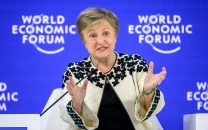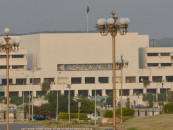Hafeez Shaikh gets revenue portfolio back
With the decision, the premier ended uncertainty in power corridors as to who would look after the affairs of FBR

Prime Minister Imran Khan on Monday finally gave the portfolio of revenue to Federal Minister for Finance Dr Abdul Hafeez Shaikh, just a couple of days after elevating him from adviser to the full-fledge minister but clipping his wings by not extending the said portfolio.
With the decision, the premier ended the uncertainty in the power corridors as to who would look after the affairs of Pakistan’s top tax machinery – the Federal Board of Revenue (FBR) – as Shaikh had apparently enjoyed more powers being an adviser than being the finance minister.
“In exercise of the powers conferred by rule 3(4) of the Rules of Business, 1973, the Prime Minister has been pleased to allocate the portfolio of Revenue to Dr Abdul Hafeez Shaikh, Federal Minister for Finance, with immediate effect,” the cabinet division’s notification stated.
“Consequently, Dr Abdul Hafeez Shaikh will now be the Federal Minister for Finance and Revenue,” it added.
On December 11, Shaikh was sworn in as the federal finance minister after President Dr Arif Alvi had administered oath to him.
Reportedly, Shaikh took the issue of withdrawal of the Revenue Division portfolio with the prime minister on Friday and was assured that the matter would be resolved within a few days.
The decision to make Shaikh a minister was made after the Islamabad High Court barred him from heading the cabinet committee on privatisation and all advisers and special assistants of the prime minister from heading committees or taking policy decisions.
“An adviser to the prime minister is not [a] member of the cabinet and cannot participate in the proceedings, hence he can also not be a member or even chair the committee of the Cabinet. He can address the parliament but cannot participate in the voting process,” the IHC order read.
The order stated that the adviser to the PM was a constitutional post, and that there could be a maximum of five advisers to the premier, and the conferring of status of federal minister on the adviser was only for the purposes of perks and privileges, and did not make him/her a federal minister as such.
“The special assistant to the prime minister is not a minister of state or a federal minister but only enjoys the status for the purposes of perks and privileges. He cannot address the parliament, nor has any executive authority vested in him. He also is not a member of the cabinet and cannot take part in the proceedings of the same,” the IHC stated in its detailed order.
Since Shaikh was not an elected member of parliament, the prime minister made him the federal minister for finance under Clause 9 of Article 91 of the Constitution, which allowed a non-member of parliament to be appointed as minister for a maximum of six months.
Keeping the bar of six months in view, Shaikh can be elected as senator in the Senate poll in March as Clause 9 of the Article 91 states that a minister who for any period of six consecutive months is not a member of the National Assembly shall, at the expiration of that period, cease to be a minister and shall not before the dissolution of that assembly be again appointed a minister unless he is elected a member of that Assembly “provided that nothing in this clause shall apply to a minister who is a member of the Senate.”
According to the Rules of Business of 1973, the Revenue Division is responsible for tax policy, tax administration, avoidance of double taxation agreements with other countries, legal proceedings and litigation in tax matters and administration of Customs and Excise Group and Income Tax Group.



















COMMENTS
Comments are moderated and generally will be posted if they are on-topic and not abusive.
For more information, please see our Comments FAQ